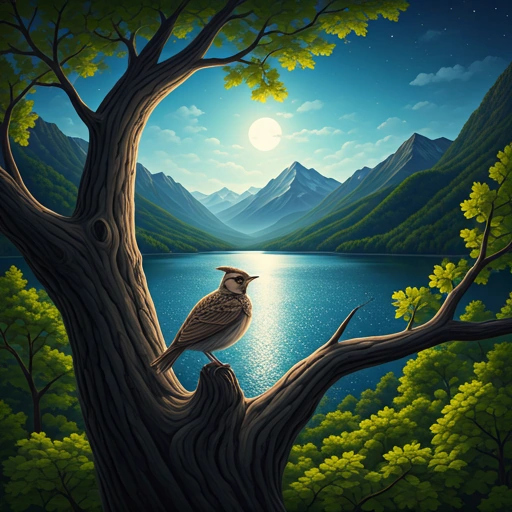
In a quiet valley, nestled between mountains that kissed the heavens, there lived a lark with feathers as dark as the midnight sky. Her name was Nyra, and though her song was sweet enough to make the stars pause in their nightly dance, she carried within her heart a deep discontent. For while her voice could enchant the winds and soothe the restless rivers, her feathers bore none of the brilliance she so admired in others.
Each morning, Nyra would perch upon an ancient oak tree overlooking a crystalline lake. There, she watched the radiant sunbirds as they danced in golden light, their plumage shimmering like molten fire. She envied their beauty—the way their colors seemed to hold fragments of dawn itself. “If only I were like them,” Nyra whispered to her reflection in the water below. “Perhaps then I would be worthy of admiration.”
One fateful day, after a storm had swept through the valley, Nyra stumbled upon something extraordinary: scattered across the forest floor were fragments of feathers—sunbird feathers—gleaming with hues of amber and crimson. The storm had shaken them loose from their rightful owners. Nyra’s heart raced as she gathered them one by one, her talons trembling with excitement.
Back at her nest high in the oak tree, Nyra worked tirelessly through the night. With strands of spider silk and drops of dew as adhesive, she wove these radiant feathers into her own wings until they gleamed like firelight against her dark frame. When dawn broke and sunlight spilled over the valley, Nyra gazed at herself in awe. She no longer saw a shadowed lark but a creature cloaked in brilliance—a being who could rival even the sunbirds themselves.
Emboldened by her transformation, Nyra descended from her perch and joined a gathering of sunbirds near the lake’s edge. At first glance, they marveled at her appearance; whispers rippled through their ranks like wind through tall grass. But soon enough, their admiration turned to suspicion.
“Who are you?” asked one sunbird whose feathers glowed like embers.
“I am one of you,” Nyra replied confidently. “See how my wings shimmer? Surely I belong among your kind.”
But as Nyra moved closer to join their circle, a gust of wind swept through the valley and tugged at her borrowed plumage. One by one, the false feathers began to loosen and fall away until all that remained was Nyra’s true form—a simple lark cloaked once more in shadow.
The sunbirds recoiled with disdain. “You are not one of us,” they said coldly. “You wear our colors but do not carry our essence.” And with that, they turned away from Nyra and left her standing alone beneath an indifferent sky.
Humiliated and burdened by the weight of her deception, Nyra retreated to the solitude of her oak tree. There, she tore away the remnants of the stolen feathers, each one falling like a shard of broken pride. As they drifted to the forest floor below, Nyra felt an ache deeper than rejection—it was the sting of realizing that even cloaked in borrowed beauty, she had not found the joy or belonging she so desperately sought. The brilliance she had envied had been nothing more than a fleeting illusion.
For days, Nyra sat in silence, her once-melodious voice stilled by shame and sorrow. She avoided her reflection in the lake and turned away from the sunbirds’ distant songs. Yet as time passed, nature began its quiet work of healing. Gentle rains softened her grief, while winds whispered through the leaves with a soothing cadence. The world around her seemed indifferent to her pain but also strangely accepting—its rhythms continued unbroken, as if inviting her to rejoin them.
One evening, as twilight painted the valley in hues neither bright nor dark but somewhere beautifully in between, Nyra heard a voice call out from below: “Why do you silence your song?” Startled, she looked down to see an owl perched on a low branch. His eyes gleamed with wisdom born of countless nights under starry skies.
“My song is unworthy,” Nyra replied softly.
The owl tilted his head thoughtfully before speaking again. “Unworthy? Child, do you not see? The universe does not measure worth by how brightly one shines but by how truly one exists.”
Nyra listened intently as he continued: “The stars are no less radiant because they dwell in darkness; rivers are no less purposeful because they twist and turn along their path. Your voice is not meant to mimic another’s brilliance—it carries its own truth that no feather could ever replace.”
That night, under a canopy of stars that neither judged nor compared but simply existed alongside one another, Nyra sang once more—not for approval or admiration but because it was hers alone to give. And for the first time, her song felt whole.
————
Moral:
True beauty and fulfillment are not found in the borrowed brilliance of others, but in the authenticity of our own essence. The world does not demand perfection or conformity to ideals shaped by comparison; it asks only that we honor the unique gifts we carry within ourselves. Just as stars illuminate the vastness of night without envy for the sun, and rivers carve their paths without longing to be still lakes, so too must we find peace in our own nature.
When we abandon the pursuit of external validation and embrace who we truly are—flaws, shadows, and all—we discover a light that no imitation can replicate. It is this inner radiance, born from self-acceptance and truth, that connects us to the greater harmony of existence. In being unapologetically ourselves, we fulfill a purpose far more profound than any fleeting admiration could ever provide.
